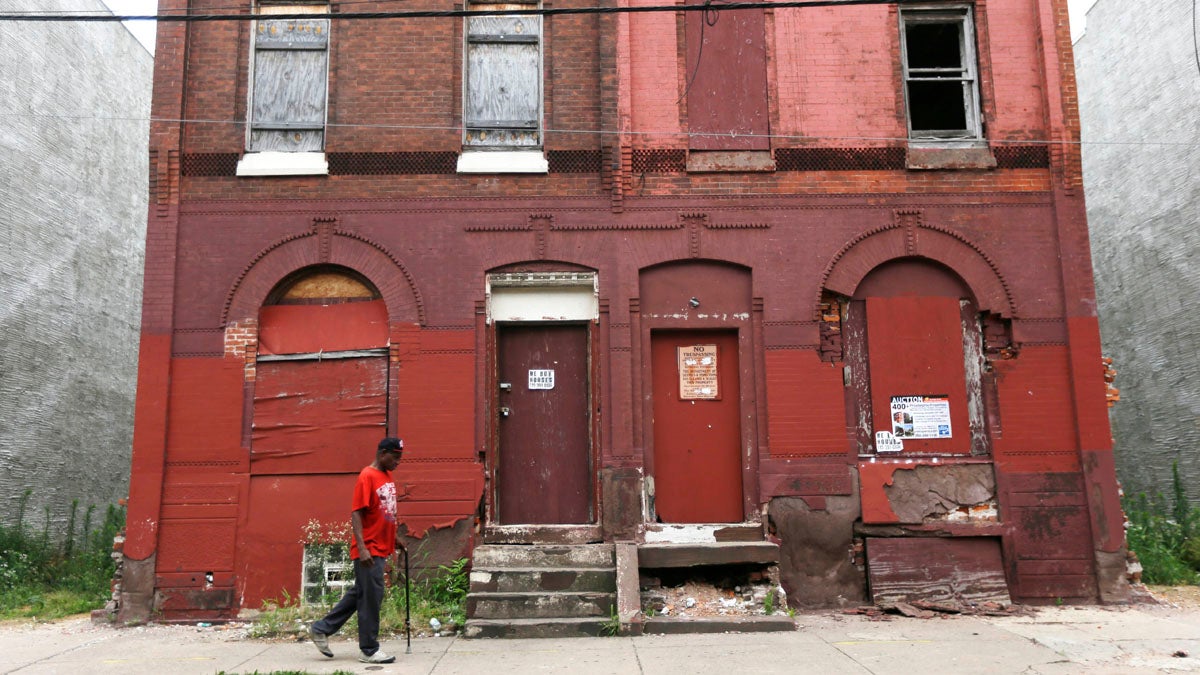After closeup look at poverty, Pa. lawmaker to begin work on policy

A man walks through a blighted neighborhood in Philadelphia. (Matt Rourke/AP Photo)
A Pennsylvania GOP lawmaker has finished the first part of his mission to learn more about the nearly 1.8 million people in the state living in poverty.
Indiana County state Rep. Dave Reed and other Republican legislators spent the last five months crisscrossing the state, traveling everywhere from the Poconos to North Philadelphia, and talking to low-income residents, government officials and advocates for the poor.
Reed said he has learned that there is near-unanimous consent among those people that the government and nonprofit sector’s current efforts to combat poverty are insufficient. He expected at least some advocates to defend the status quo.
“Probably the most eye-opening component to me was the recognition by so many folks at the grassroots level that the system was broken,” he said, as well as the “frustration that a lot of folks held that they didn’t feel like there was any hope of actually changing the system for the better.”
Reed explored education, homelessness, financial literacy, public assistance programs and hunger. On the latter issue, he expressed concerns about the across-the-board cuts to the federal government’s Supplemental Nutrition Assistance Program, aka food stamps, that went into effect last month.
“It’s a little frustrating to hear folks always focus on cutting benefits in Washington, D.C.,” he said. “Perhaps if they look at the integrity of the [food stamps] program, and some common-sense changes with the program and give the states a little bit more flexibility, we could actually make those dollars go further and serve the truly needy in a more effective manner than just arbitrarily cutting benefits across the board.”
Reed said he wants to address “benefits cliffs,” in which a low-income person becomes ineligible for assistance programs when she earns a slightly better wage at work. He also believes the state should collect better data on the effectiveness of its anti-poverty efforts. He said the Philly-based nonprofit Congreso provides a best practice that it could perhaps adopt.
“They were using the data to evaluate [their anti-poverty programs] every couple weeks, every couple months,” he said. “If they had a program that wasn’t working and was not getting the results they had hoped for, they changed the program.”
Some critics and naysayers reconsider
The idea of a poverty tour sounds innocent enough, but Reed initially caught flak from both sides of the aisle for attempting a conversation.
“We certainly had folks from the left side of the equation questioning why a Republican cares about poverty,” he said. “And we had folks from the right side of the equation wondering whether I could actually be a Republican and talk about poverty.”
Some of Reed’s critics have come around. Philadelphia’s Community Legal Services was one group that initially gave him a cool reception, but now lawyer Sharon Dietrich said Reed has taken their ideas seriously.
“Unfortunately, because there sometimes has been more discussion of poverty by the Democratic Party than the Republican Party, there may have been suspicion,” she said. “But, in fact, Rep. Reed’s heart seems to have been at the right place. And we welcome both parties looking seriously at poverty.”
During the next phase of Reed’s anti-poverty initiative, he plans to develop policy recommendations or legislation based on what he has learned on the tour.
WHYY is your source for fact-based, in-depth journalism and information. As a nonprofit organization, we rely on financial support from readers like you. Please give today.

